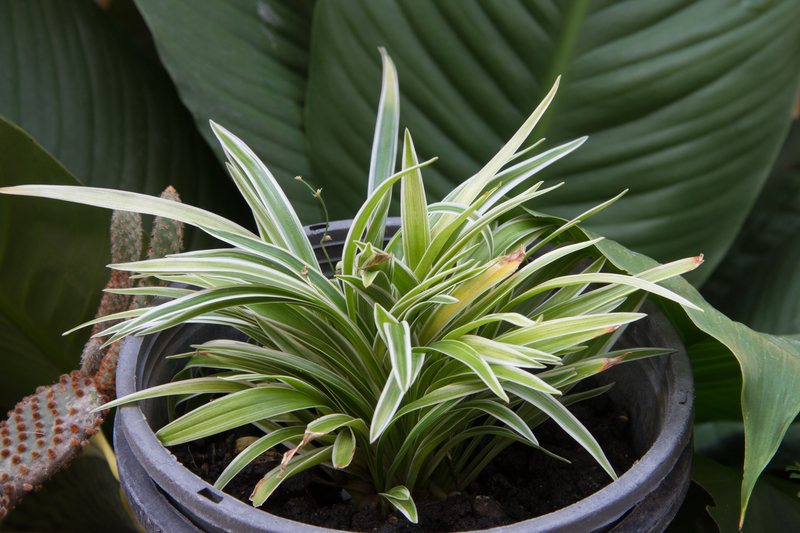Harmony in Nature: Zen Garden Concepts for a Relaxing Oasis
Posted on 05/06/2025
Harmony in Nature: Zen Garden Concepts for a Relaxing Oasis
If you're seeking to infuse your outdoor space with a sense of peace and tranquility, creating a Zen garden may be the answer. Rooted in ancient Japanese traditions, Zen gardens epitomize harmony in nature, blending simplicity, symbolism, and exquisite design elements. In this comprehensive guide, we explore the art of designing a harmonious Zen garden oasis, offer practical Zen garden concepts for relaxation, and outline steps to transform any space into a sanctuary for mindfulness and reflection.
What is a Zen Garden?
A Zen garden (also known as karesansui, or dry landscape garden) is an outdoor space designed to inspire contemplation, meditation, and a sense of oneness with nature. Originating in Japan, these tranquil gardens emphasize simplicity and minimalism--using rocks, gravel, sand, and carefully chosen plants to represent the essence of the natural world.
Key Principles of Zen Garden Design
- Simplicity: Stripping away the unnecessary to reveal the beauty of essential forms.
- Balance and harmony: Arranging elements in a way that feels peaceful and natural, mirroring the quiet calm found in wild landscapes.
- Symbolism: Rocks, sand, and plants symbolize mountains, rivers, and forests, promoting contemplation on nature's cycles.
- Asymmetry: Embracing imperfection and impermanence, echoing the philosophy of wabi-sabi.

Why Create a Zen Garden Oasis?
Today's world can be hectic, with constant connectivity and noise. A harmonious Zen garden oasis provides a much-needed refuge--transforming your backyard, patio, or even a small indoor space into a restorative environment. Here are some reasons to consider this unique landscape style:
- Stress reduction: The soothing visuals and tactile experiences calm the mind and support relaxation.
- Mindfulness and meditation: A Zen garden's simplicity encourages introspection and focused breathing exercises.
- Aesthetic beauty: Carefully placed elements provide year-round visual interest, appealing to lovers of art and nature alike.
- Low maintenance: Drought-tolerant features and minimal plants make Zen gardens easy to care for.
- Connection to nature: Invites wildlife and promotes eco-friendly gardening practices.
Fundamental Zen Garden Concepts
To establish harmony in nature within your own space, it's helpful to understand the essential concepts guiding authentic Zen gardens. From the materials you select to the layout and symbolism, each choice flows from these time-tested principles.
1. Shizen: Naturalness
Shizen emphasizes the beauty of spontaneous, uncontrived design. Instead of rigid perfection, seek to mimic the irregular yet balanced arrangements found in Japanese landscapes. Position stones at uneven intervals, vary plant groupings, and allow for asymmetry.
2. Kanso: Simplicity
Reduce clutter, strive for minimalism, and remove distractions. Each item in a Zen garden should have a clear function or meaning, adding to the overall sense of calm.
3. Fukinsei: Asymmetrical Balance
Rather than perfect symmetry, Zen principle promotes fukinsei--the delicate balance achieved through deliberate asymmetry. Use this to make your garden appear more natural and soothing to the eye.
4. Yugen: Subtle Mystery
Create a sense of mystery by partially hiding elements amongst foliage or behind stones. This invites viewers to linger, explore, and contemplate hidden meanings.
5. Ma: Negative Space
Incorporate empty spaces in your design to allow the viewer's mind to rest. These gaps are just as important as the elements themselves, fostering a meditative environment.
Essential Elements for a Zen Garden Sanctuary
A harmonious Zen oasis incorporates a thoughtfully selected palette of natural materials. Each element holds symbolic significance and contributes to the whole.
Sand and Gravel
Gravel or sand forms the backbone of a classic Zen garden, representing water, oceans, or streams. Raked into patterns of waves or ripples, it evokes the gentle flow of nature. The act of raking itself can become a meditative ritual, focusing the mind and easing tension.
Rocks and Stones
Stones symbolize islands, mountains, or animals, lending structure and vertical interest. Choose each stone with care--consider texture, color, and size. Odd numbers of stones are typically used, placed in harmonious groupings. Avoid formal arrangements in favor of organic clusters.
Water Features
While not essential, a water element (such as a small pond, stream, or bamboo fountain) can greatly enhance the garden's tranquility. The sound of water soothes the senses, masks urban noise, and invites wildlife like birds or dragonflies.
Moss and Groundcovers
Soft moss adds an ancient, enchanted feel--mimicking shaded forest floors. Where moss won't thrive, low-maintenance groundcovers or carefully selected grasses can evoke the same mood.
Bamboo and Plants
A true Zen-style landscape uses plants sparingly for subtle emphasis. Choose evergreens, dwarf pines, Japanese maples, bamboo, or azalea for year-round structure, texture, and color. Remember--less is more; let open space dominate.
Bridges, Stepping Stones, and Pathways
Paths in a Zen garden guide both the eye and the visitor, symbolizing life's journey. Curved or irregular shapes encourage mindfulness, slowing your pace for deeper appreciation of your surroundings.
Designing Your Relaxing Zen Oasis: Practical Concepts and Steps
Ready to create your own Zen-inspired oasis? Whether you transform an entire yard or dedicate a small corner to your retreat, these practical steps will help establish harmony in your outdoor (or indoor) space.
Step 1: Choose Your Site
- Select a quiet, secluded part of your garden, patio, balcony, or even sunroom. The space doesn't need to be large--some Zen gardens are as small as a tabletop, while others occupy grand temple grounds!
- Consider sun exposure, drainage, and privacy when choosing your location.
Step 2: Create a Scaled Layout
- Sketch your design on paper, marking the placement of major elements (stones, sand area, plants, water, pathways).
- Remember to leave ample negative space for a serene atmosphere.
Step 3: Prepare the Ground
- Remove grass, weeds, and debris from the site. Level or gently contour the earth to imitate natural landscapes.
- Lay a weed barrier if needed. Install gravel or sand to the desired depth (2-4 inches is typical for raking).
Step 4: Place Stones and Features
- Start with the largest rocks or focal points, working your way down to smaller stones.
- Group stones in odd numbers, using asymmetry and varied orientations to suggest a natural scene.
- If using water features or a lantern, position these with care so they appear organically integrated.
Step 5: Add Plants
- Arrange selected plants for maximum impact--think about seasonal changes and how colors, textures, and heights will interact.
- Keep plantings sparse, focusing on evergreens, moss, and species that thrive in your climate zone.
Step 6: Final Touches--Paths and Accessories
- Lay stepping stones, gravel paths, or mossy trails to encourage slow, mindful movement through the garden.
- Add subtle accessories like an ornamental lantern, bamboo fence, or meditation bench, but avoid overcrowding the space.
Step 7: Rake and Maintain
- Rake gravel or sand into flowing patterns. Experiment with spirals or concentric circles for different effects.
- Remove weeds, prune plants as needed, and refresh raked patterns regularly. Seasonal maintenance is minimal, making this style ideal for busy lifestyles.
Indoor Zen Garden Ideas for Small Spaces
Don't have a yard or outdoor area? You can still bring the harmony of a Zen oasis into your home. Here are a few creative concepts for indoor Zen gardens that add instant tranquility:
- Tabletop Zen Gardens: Arrange miniature rocks, sand, moss, and tiny rakes in a shallow tray for a portable meditative escape.
- Moss Terrariums: Create a glass-enclosed scene with moss, pebbles, and a Buddha figurine for windowsills or desks.
- Wall-Mounted Gardens: Vertical planters or shadow boxes with sand, stone, and tiny bamboo offer visual calm in apartments or offices.
Remember: the same design principles of harmony and balance apply, regardless of your garden's size. Keep arrangements minimal, intentional, and focused on promoting relaxation.
Enhance Your Zen Garden Experience: Lighting, Sounds, and Accessories
Lighting
- Solar lanterns, soft LED fixtures, or traditional stone lanterns (toro) extend enjoyment into the evening, casting gentle light and shadow patterns for a soothing ambiance.
Sound
- Install a bamboo water fountain or add wind chimes for calming natural melodies. These features mask background noise and heighten your connection to your oasis.
Seating
- Simple benches, meditation stones, or a tatami mat invite you to pause, sit, or stretch while enjoying your tranquil retreat.
Seasonal Zen Garden Maintenance Tips
- In spring and summer, gently prune any overgrown plants and remove fallen leaves.
- Refresh sand or gravel regularly to keep patterns crisp and vibrant.
- Check stone and pathway stability after heavy weather and reset if needed.
- Clean water features to prevent algae and maintain gentle water flow.
Zen Garden Variations: Styles from Around the World
While the classic Japanese Zen garden inspires the majority of designs, many gardeners adapt the concept to reflect their local environment or cultural influences. Here are a few global Zen-inspired garden variations:
- Contemporary Zen: Sleek lines, modern materials, and sculptural elements for a minimalist urban retreat.
- Desert Zen: Use of succulents, cacti, and regional boulders to capture dry landscapes reminiscent of the American Southwest or Australian Outback.
- Tropical Zen: Incorporate natural wood, bamboo water basins, and lush, low-maintenance foliage for a more exotic vibe.
- Cultural Fusion: Blend elements from Chinese scholar gardens, Korean stone gardens, or even Mediterranean gravel gardens while maintaining a focus on harmony and simplicity.

Benefits of a Zen Garden Oasis
Choosing to create a Zen garden retreat delivers long-lasting rewards for the mind and body:
- Reduced anxiety and improved focus through regular meditation or mindful gardening.
- Enhanced creativity and problem-solving abilities via quiet contemplation.
- Physical exercise from gentle maintenance tasks, such as raking or planting.
- Year-round visual enjoyment from the interplay of rocks, gravel, and evergreen plants.
- Elevated property value and curb appeal thanks to a sophisticated, timeless landscape.
Conclusion: Embrace Harmony and Mindfulness Everyday
A Zen garden oasis is more than just a landscape style--it's a philosophy that honors harmony in nature, cultivates tranquility, and invites mindful living. By following the basic concepts detailed here and adapting them to your unique space, you can easily create a relaxing retreat that nourishes your spirit every day. Whether you choose a grand outdoor sanctuary or a compact indoor vignette, the act of designing, maintaining, and enjoying your garden will strengthen your bond with nature--and with yourself.
Let your Zen-inspired retreat be a daily reminder to slow down, savor beauty, and cultivate peace both within and without. Experience firsthand the power of harmony in nature as your oasis transforms your surroundings into a haven for wellbeing, meditation, and deep relaxation.
Latest Posts
The Art of Transforming Waste into Healthy Soil
Get started with your own container garden today
Gain Confidence with These 9 Foundations of Gardening
How to Turn Your Outdoor Space into a Child-Friendly Oasis
Transform Your Garden with Hedge Trimming Shapes and Techniques



